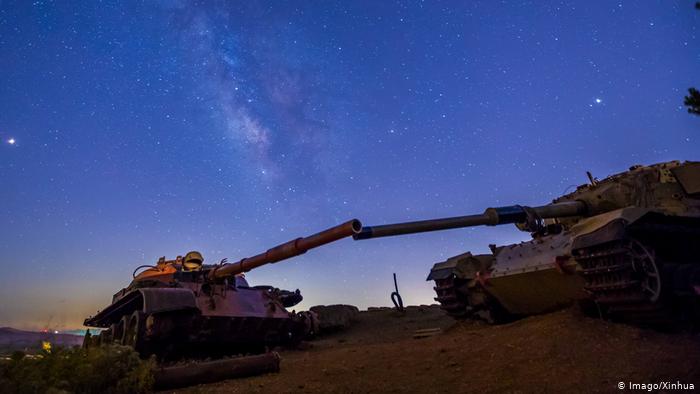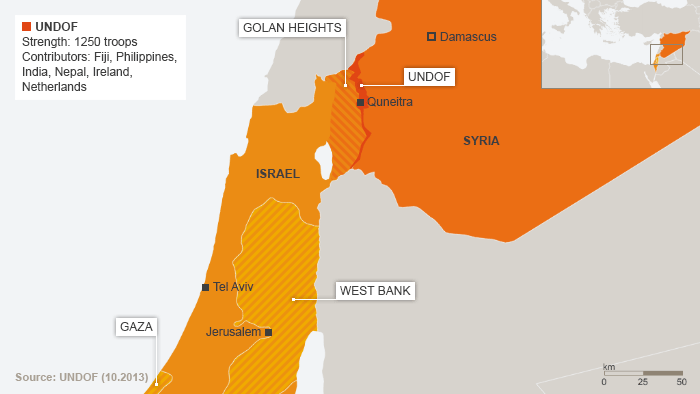Golan Heights : Part of Israel's Defence Strategy
"The Golan was always seen as the carrot that Israel would cede for peace with Syria, and now peace doesn't matter, Syria doesn't matter."
Kareem Sakka, editor-in-chief, Raseef22, Arabic news site
“Following the Arab Spring in Syria, 90% of the Druze prefer Israeli
sovereignty. There’s no question here at all. Three hundred people went to protest [The U.S. decision to recognize the Golan Heights as part of sovereign Israel] out of 24,000 Druze. That’s
nothing. Supporters of Syrian nationalism are few."
"Many [Druze living in villages on the Golan Heights] have family across the fence [in Syria]. They fear that if they support Israel, their families in Syria will be harassed."
"[The Druze don’t feel safe siding with Israel.] Israelis have a history of returning territory. Israel was
in Lebanon for 25 years and then abandoned its allies. The same story
happened with Yamit in Sinai [returned to Egypt]. For years
Israeli governments have held overt negotiations over returning the West
Bank and covert negotiations over returning the Golan Heights. People
[here] think that Israel could leave the territory, and whoever
supported the Israelis would pay a heavy price."
Abbas Abu Awad, head, Buqa’ata local council, Golan Heights, Israel
"The discussion among the Druze is divided between the public and the
personal. In public they have to support Assad, but in private
conversation you hear the complete opposite. They support remaining
under Israeli rule."
"[In a few years, opposition to naturalization
will decrease substantially.] Israel has controlled the Golan Heights
for more years than Syria controlled it. Reality is more
powerful than anything."
Eli Zigdon, chairman, Masaada committee
"The public, when they think about Syria, will be more concerned with the death and suffering [of the sectarian civil war] than with the official loss of something that has been gone for a long time."
"The notions of international order and international law are going to take a big hit here. Right now, what would we say to Saddam Hussein in Kuwait? 'We don't want you to be there'. 'O.K., on what basis'?"
Hussein Ibish, scholar, Arab Gulf States Institute
 |
| Why it matters who controls the Golan Heights |
For a purported scholar Mr. Ibish doesn't appear to be a very big thinker, with a well-rounded perspective and an understanding of international law, particularly the distinction between offense and defence. When a nation is attacked repeatedly and fights back to protect itself and its inhabitants, repelling the attacking force and gaining territory in the process, the return of that territory hinges on whether or not the attackers are prepared to retreat from their position and the victorious nation is prepared to return their gains.
Under international law, every sovereign nation is entitled to protect itself from invaders intent on forcing armed conflict on an invaded state with a view to defeating it and eradicating its borders along with destroying or looting its possessions. Territory gained, particularly territory that has a defensive purpose is rarely returned. Syria repeatedly refused to sign a peace treaty with Israel even when informed time and again the Golan Heights would be returned only with the signing of such a treaty.
On the other hand, when one country invades another with the purpose of destroying its sovereignty over part of its territory and the invading country claims the territory it has taken as its own, this is clearly a contravention of international law. That Iraq invaded Kuwait, claiming it was once part of Iraq and with the intention of extending Iraq's borders to include the tiny oil emirate demonstrating a clear international crime has no comparison with Israel's defence and Syria's invasion.
It is more analogous to China's accession of Tibet, Turkey's illegal invasion of Cyprus, occupation of Kurdish heritage geography, and Russia's Crimea and Donbass grab in Ukraine and attacks in Georgia.
Both China and Russia, permanently sitting on the United Nations Security Council, feel secure in condemning the United States for its recognition of Israel's de facto and legal sovereignty of the Golan Heights as a necessary aid to its self-defence from the sinister plans of future attacks from Syria, Lebanon's Hezbollah and Iran's Republican Guard Corps and Shiite militias. And Turkey feels secure in decrying the possession by Israel of 'Islamic' territory; corrupt, territorial bandits, all of them.
As for the Arab Gulf countries in the Middle East, a disinterested shrug more likely reflects their current attitude, given the tense relations between the majority Sunni Muslim nations and their Persian Shiite adversary with its territorial expansion plans to increase its influence and hoped-for-conquest of the Middle East, after destroying Israel. As a strategic military area the Golan Heights is a necessary military defense for Israel against a sworn and intransigent enemy, a decided asset Israel must continue to hold.
The Arab Druze representing its original inhabitants, have avoided taking a political position. The 22,000 Arab Druze living on the Golan have been joined by Israeli settlers living in dozens of settlements and where the settlers have planted orchards, built wineries, hotels and a ski resort, resources of the area used to good advantage for all its residents. Arab Sunni groups took note that al-Assad bombed Syrian cities, gassed his rebellious Sunni Syrian citizens to retain power.
The brutality that the Syrian regime imposed upon its own has resulted in few other Arab leaders interested in supporting Syria on this issue of Israel retaining not the spoils of war, but the very symbol of its need to protect itself from having the Golan once again fall back into the malevolent hands of a pitiless war-monger for whom divisive brutality represents the dignity of Arab Medieval history, not a willingness to live in peace and security and co-operation.
 |
| CHILDREN PULL SNOW sleds at the Mount Hermon ski resort in the Golan Heights this week..
(photo credit: AMMAR AWAD / REUTERS)
|
Labels: Conflict, Defence, Golan Heights, Israel, Secturity, Syria, United States



0 Comments:
Post a Comment
<< Home